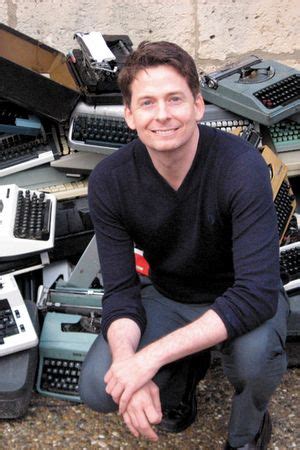A Quote by Ray Bradbury
[His] library was a fine dark place bricked with books, so anything could happen there and always did. All you had to do was pull a book from the shelf and open it and suddenly the darkness was not so dark anymore.
Related Quotes
You could tell from the books whether a library was meant for show or not. Books that were used had an open, interested feel to them, even if closed and neatly lined up on a shelf in strict order with their fellows. You felt as though the book took as much interest in you as you did in it and was willing to help when you reached for it.
When I was working upon the ABC books, I wanted to show different ways that mainstream comics could viably have gone, that they didn't have to follow 'Watchmen' and the other 1980s books down this relentlessly dark route. It was never my intention to start a trend for darkness. I'm not a particularly dark individual.
I am not sure I knew what I was doing, writing an "apocalypse" novel, when I started this book. Now that the book is done, I can own that I have in fact written an apocalypse novel, one that speculates on a dark, dark future. Why I did it, I really don't know - every time people read my work they comment on its darkness, its sadness.
How did it happen that now he could see everything so clearly. Something had given him leave to live in the present. Not once in his entire life had he come to rest in the quiet center of himself but had forever cast himself from some dark past he could not remember to a future that did not exist. Not once had he been present for his life. So his life had passed like a dream. Is it possible for people to miss their lives the way one can miss a plane?
When the oldest Chatwin, melancholy Martin, opens the cabinet of the grandfather clock that stands in a dark, narrow back hallway in his aunt’s house and slip through into Fillory...it’s like he’s opening the covers of a book, but a book that did what books always promised to do and never ac tually quite did: get you out, really out, of where you were and into something better.
Perhaps I could best describe my experience of doing mathematics in terms of entering a dark mansion. You go into the first room and it's dark, completely dark. You stumble around, bumping into the furniture. Gradually, you learn where each piece of furniture is. And finally, after six months or so, you find the light switch and turn it on. Suddenly, it's all illuminated and you can see exactly where you were. Then you enter the next dark room.
When you open a book,” the sentimental library posters said, “anything can happen.” This was so. A book of fiction was a bomb. It was a land mine you wanted to go off. You wanted it to blow your whole day. Unfortunately, hundreds of thousands of books were duds. They had been rusting out of everyone’s way for so long that they no longer worked. There was no way to distinguish the duds from the live mines except to throw yourself at them headlong, one by one.





































